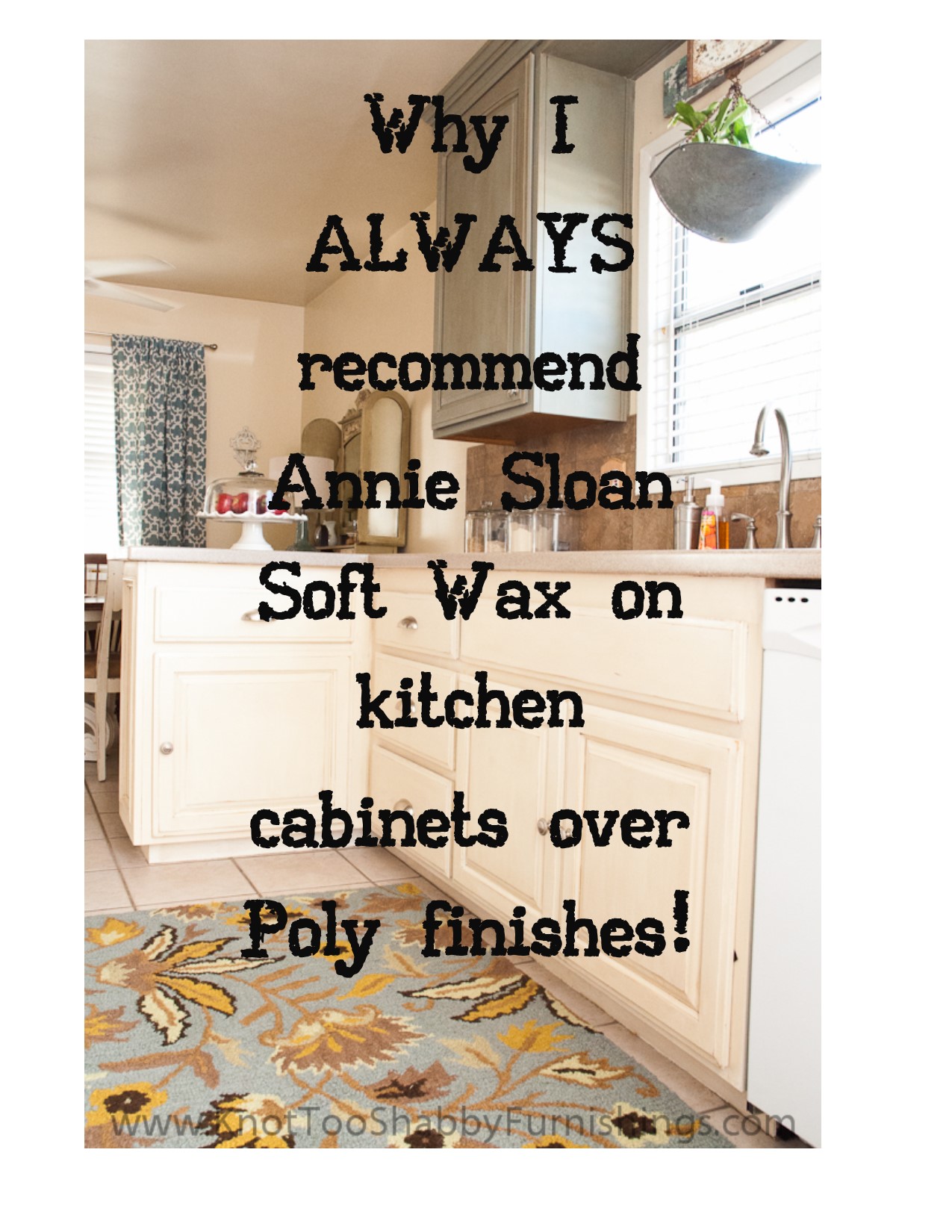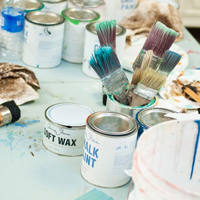“I’m planning to paint my kitchen cabinets. Why would I use Annie Sloan paint and wax vs a high quality paint with polyethylene? Seems like a multi step process and it intimidates me.”
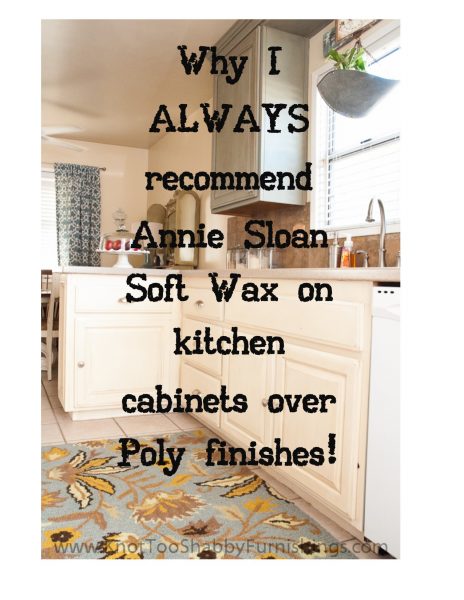
This is a GREAT Question…and a real one from on of our followers on our knot too shabby Painters page on Facebook. The answer, in and of itself is a bit long for a facebook post, but definitely blog worthy!
Let me start by stating that I have painted multiple kitchen cabinets. I’ve used traditional latex way back in the day on my parents cabinets, and more recently I used Chalk Paint® on my own kitchen cabinets.
About fifteen years ago, when we painted my mom and dad’s kitchen, it took the ENTIRE family about two weeks. My husband helped out (before we were married…that’s commitment I tell ya’), my sister helped, mom and day obviously were helping and then I was there to help out, too. The process went something like:
- Remove Cabinets
- Set up a work station outside with folding tables and saw horses
- Aggressively clean cabinets using highly toxic TSP type of chemicals
- Sand original finish…but don’t breathe because sanding dust will be EVERYWHERE
- Clean…again
- Prime one or two thin coats
- Paint two coats
- Reattach cabinetsThat process took somewhere in the vicinity of 200 man-hours. It was extremely labor intensive. But, the end result looked clean and sleek (not so much anymore…it has been 15+ years, after all).
I have nothing against latex or oil based paints. When applied correctly, they offer great finishes. But, as I said, it’s labor intensive.
So, the real question is WHY DID I USE ANNIE SLOAN PAINT when I painted my kitchen cabinets instead of latex with poly…and why will I (almost) ALWAYS recommend Chalk Paint® for your kitchen cabinet makeover?
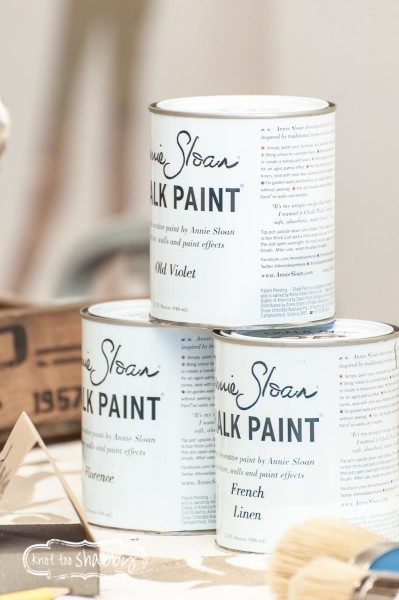
- The prep work is minimal by comparison to other paint products.
YES! You have to clean.
YES! You do have to do MINIMAL prep work. Minimal being the operative word.I recommend a thorough cleaning using soap and water. Dish soap on a sponge, Simple Green, Fabuloso…whatever your cleaning product of choice works well to clean off dirty finger prints, grease build-up, oil stains, food spills, etc. Heck, you might decide after you clean the cabinets that they don’t need to be painted after all (Don’t laugh…I’ve heard of that happening)!Once your cabinets are clean, use Denatured Alcohol and a soft cloth to wipe down all of the surfaces. Denatured Alcohol is a natural deglosser and cuts through that last bit of grease and residue left behind while giving you a great surface to start painting.Finally, finish off with a clean water rinse to remove any residual cleaner left behind!CHALK PAINT® HAS GREAT ADHESION AND WILL BOND TO MOST ANY FINISHES…EVEN GREASY, DIRTY OILY FINISHES. BUT, WHEN THE GREASE GETS WIPED OFF OR DIRT RESIDUE IS SCRUBBED DOWN, IT WILL TAKE THE CHALK PAINT® ALONG WITH IT. THAT’S WHY IT IS IMPORTANT TO CLEAN YOUR SURFACE PRIOR TO PAINTING!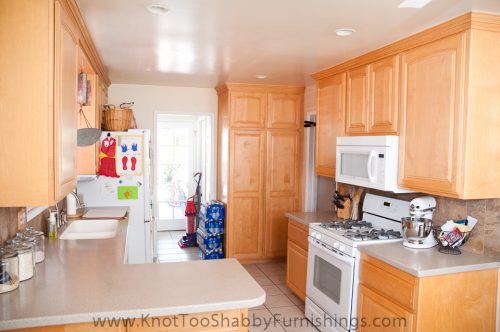
My kitchen cabinets before
- I was able to paint my cabinets in the comfort of my own home without having the mess of sanding or the aggravation of priming.Not only the ease of use made Chalk Paint® ideal, but because it is water based and VERY EASY to clean, I only had to do minimal prep-work related to taping and covering surfaces. I wasn’t worried about covering the floor or counters with paper because any spilled paint could be wiped off with nothing more than a damp wash cloth…even after it dried.The natural ingredients in Chalk Paint® and zero detectable VOC’s meant that I could paint inside without worrying about my family being exposed to a plethora of paint fumes.I painted the cabinet doors in place. I didn’t have to clean out cabinets and drawers or remove hinges. (Read the original post about how I tackled this project over a 5-day timeline)
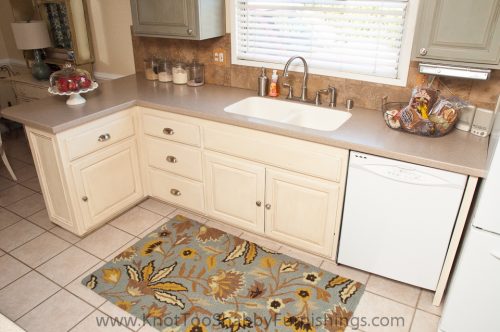
- Chalk Paint® is highly pigmented which allows for superior coverage as compared to other paint brands.The high pigmentation in many of the Chalk Paint® colors provide that you only need one coat to cover. I picked a color that I knew would provide superior coverage to save on time and effort.Even if you go with a traditional white finish, you’ll only need two coats (occasionally a third depending on the type of brush you use or the original finish) as compared with four+ coats using a latex and primer. I also have some time-saving and cost-saving tips on painting with white paint that applies to any piece you select to paint white (perhaps a separate blog post for a later date).
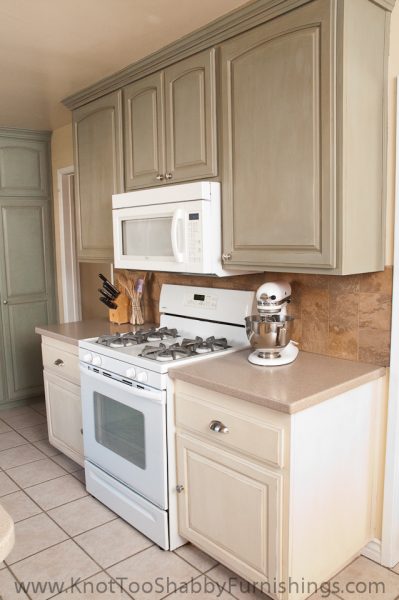
- It’s all about the WAX!THERE IS NOTHING BETTER FOR KITCHEN CABINETS THAN ANNIE SLOAN SOFT WAX!!!Let me tell you why.
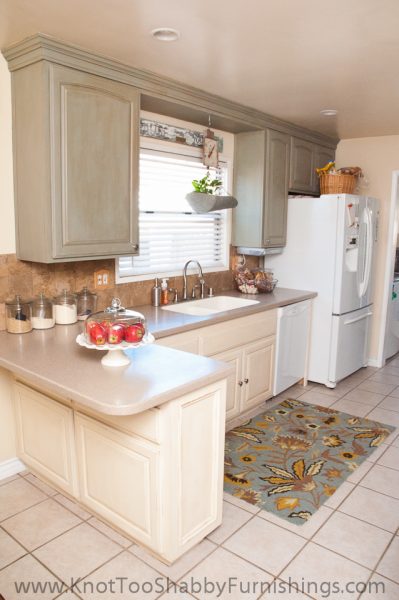 Wax breaks down over time…this is where I get gasps and wide eyes.
Wax breaks down over time…this is where I get gasps and wide eyes.“What do you mean wax breaks down? I don’t want wax. I need something durable. (insert panic here)”
The mere fact that wax breaks down with heavy use is its singular greatest benefit when applied to kitchen cabinets because it is a fixable product, whereas polyurethanes and other liquid sealers can not be fixed…they can only be re-applied (after sanding, re-painting and re-sealing).
Think stains from Crayola markers, Sharpies, blueberries, spaghetti sauce, scuff marks from shoes, dings from careless kids/pets/spouses, etc., etc. etc. Life happens in kitchens! Messes happen! With a wax top coat, your mess can be easily removed with nothing more than a very light sanding and quick reapplication of soft wax. The wax, literally removes stains, markers and scuff marks. This is of course, only necessary if your sponge or washcloth doesn’t clean it out.
BECAUSE the wax breaks down with use and kitchens get used a lot, you’ll want to mitigate how often you re-wax. I always recommend applying three coats of clear wax on kitchen cabinets over the course of 2-3 weeks. If you build up a nice, durable wax finish from the start, you will likely not have to re-wax your kitchen cabinets for at least a few years!
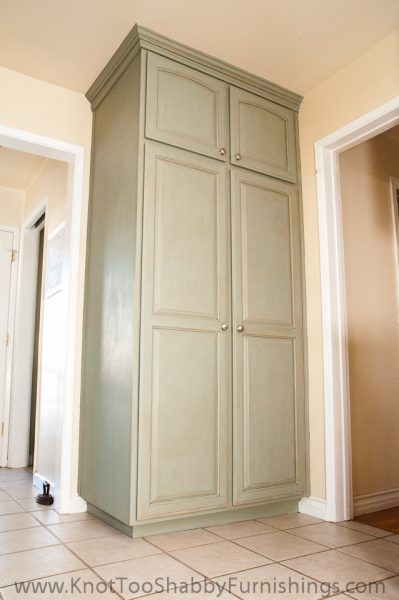
It’s been over four years since I first painted my kitchen cabinets with Annie Sloan Paint. I can attest first hand to the durability of paint and wax and the ease of cleaning them with a houseful of messy kids and large pets!
Is painting kitchen cabinets intimidating? Heck Yeah! Kitchens are important rooms of the house and if you aren’t intimidated by the sheer size of the project, please call and tell me your special secret. Intimidating or not, DIY painted kitchen cabinets are totally doable! And, following the right steps, pretty easy, albeit time consuming.
I want to see your cabinet makeovers! Share before and/or after pictures of your Chalk Paint® cabinet makeovers on our knot too shabby PAINTERS facebook page!

